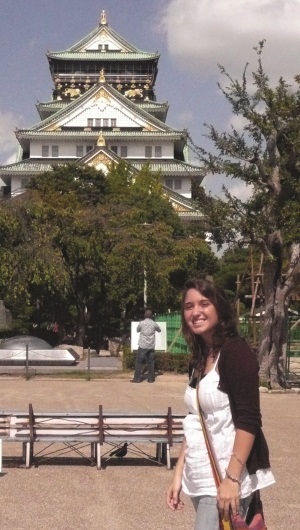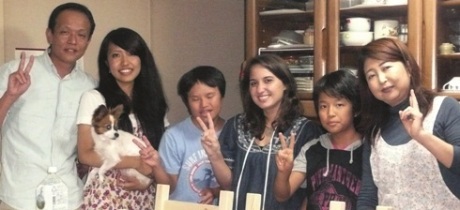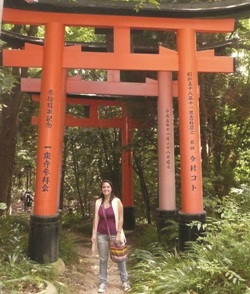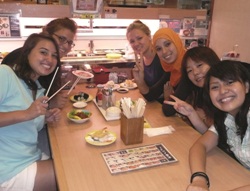Photo by Dana Smillie |
|||||||||||||||||
By Henry Agbo, as told by The place known as Japan in English, I affectionately call Nihon, which means “the sun’s origin.” For me, the island country lives up to its name because, like the rising sun, it invokes positive memories, eye-opening experiences, countless adventures and opportunities that I had never imagined before I left Egypt. While I knew that spending a year as an exchange student at Kansai Gaidai University in Hirakata, Osaka, Japan would allow me to discover a unique and interesting culture completely foreign and different from anything else I had known, I could not have anticipated my caring and close-knit host family, my struggle to master written and spoken Japanese, or the excitement of my travels with a fellow AUCian and close friend, Allia Shahin. These experiences, while disparate, give a portrait of my time in Japan that, like the sun, has a trajectory rising from the first speck of light over the horizon at dawn to its descent in the evening.
When people ask me the inevitable question of why I decided to spend a year as an international student in the Asian Studies Program at Kansai Gaidai University, I give them my wellrehearsed, but completely genuine reply that I wanted to discover a unique and special place. When I decided to study abroad, I was allured by the prospect of living in London or Los Angeles because I had heard stories from friends about their remarkable experiences in these places. After being accepted to a semester-long program in London, though, I decided I wanted to extend my exchange for a whole academic year and began looking for another program that could cater to that wish. I scheduled a meeting with the International Programs Office to discuss my search, and received information about schools that matched my requirements: one for a university in Canada and another for this program at Kansai Gaidai in Japan. I went home that night and anxiously read through the brochures, but I found myself lingering for a lot longer on the Japan booklet. Perfect, I thought.
As my time wore on and the glow of the sun began to encompass me, the feeling of being welcomed increased dramatically. My host family, in particular, went to great lengths to ensure that I was enjoying my time. Although I share a room with Allia in the dorms, once or twice a month, I visit a Japanese family living an hour and a half away in the city of Nara. I play Nintendo Wii with the two boys while they ask me questions about my family, interests and life in Egypt. Soon after the start of this program, they began demanding that I come over more often than once a month, and I was happy to oblige them. The daughter of the family, Mari, constantly encourages me to speak in Japanese, allowing me to learn the colloquialisms and informal version of Japanese that people my age often use. I even had the opportunity to see a traditional Japanese household when we went to visit their grandmother, who is a marvelous cook and who made me rethink my initial aversion to Japanese food.
Studying in Japan has also allowed me to take advantage of opportunities of traveling within the country and throughout the continent to see a part of the world that I had never seen before. One of my first stops was its capital city, Tokyo, where Allia and I became incredibly lost while trying to find our bus, which was parked in front of one of many Staabacksu (yes, that is Starbuck’s Coffee). I also went to Kobe, the only city in the Kansai area with a mosque; Kyoto, to attend the moon and fire festivals; and Nagano, to go skiing in the city where Japan hosted the 1998 Winter Olympics. Next semester, I hope to see Hiroshima and Nagasaki, where atomic bombs were dropped during World War II. Outside of Japan, I have been to Thailand and Malaysia, and in the spring, I have plans to visit China, South Korea, Indonesia and maybe also the Philippines and Vietnam.
|
|||||||||||||||||


.jpg)
.jpg)


-h.jpg)